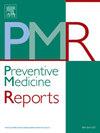Human papillomavirus awareness in a digital world: The intersection of faith and online media
IF 2.4
3区 医学
Q2 PUBLIC, ENVIRONMENTAL & OCCUPATIONAL HEALTH
引用次数: 0
Abstract
Objective: This study examines the association between Human Papillomavirus (HPV) awareness and internet use, social media use, and trust in health information from religious leaders.
Methods: We analyzed national data, collected March–November 2022 in the U.S. The final sample included 3444 adults ages 18–65 years. The outcome was HPV awareness (being aware of both HPV and the HPV vaccine). Weighted chi square and multivariable logistics regression were used to assess the outcome and each predictor, including internet and social media use, trust in health information from religious leaders, and demographic factors.
Results: Among respondents, 62.3 % were aware of HPV. Those who used the internet had higher odds of HPV awareness (aOR = 2.31, 95 %CI = 1.58,3.39), whereas those reporting perceived online health information from social media as accurate had lower odds of HPV awareness (aOR = 0.40, 95 %CI = 0.16,0.98). Social media use and trust in health information from religious leaders were not significantly associated with HPV awareness.
Conclusion: Internet use, but not social media use or trust in health information from religious leaders, may improve HPV awareness. This highlights the need for interventions to guide individuals find reliable sources online and for future research to assess accuracy of online HPV information to facilitate vaccination decisions.
数字世界中的人类乳头瘤病毒意识:信仰与在线媒体的交集
目的:本研究探讨了人类乳头瘤病毒(HPV)意识与互联网使用、社交媒体使用以及对宗教领袖健康信息的信任之间的关系。方法:我们分析了2022年3月至11月在美国收集的全国数据,最终样本包括3444名年龄在18-65岁之间的成年人。结果是HPV意识(了解HPV和HPV疫苗)。使用加权卡方和多变量logistic回归来评估结果和每个预测因子,包括互联网和社交媒体的使用,对宗教领袖健康信息的信任以及人口因素。结果:62.3%的受访者了解HPV。那些使用互联网的人有更高的HPV意识的几率(aOR = 2.31, 95% CI = 1.58,3.39),而那些报告认为来自社交媒体的在线健康信息准确的人有更低的HPV意识的几率(aOR = 0.40, 95% CI = 0.16,0.98)。社交媒体的使用和对宗教领袖健康信息的信任与HPV意识没有显著关联。结论:互联网的使用,而不是社交媒体的使用或对宗教领袖健康信息的信任,可能会提高人们对HPV的认识。这突出表明需要采取干预措施,指导个人在网上找到可靠的来源,并需要未来的研究评估在线HPV信息的准确性,以促进疫苗接种决策。
本文章由计算机程序翻译,如有差异,请以英文原文为准。
求助全文
约1分钟内获得全文
求助全文
来源期刊

Preventive Medicine Reports
Medicine-Public Health, Environmental and Occupational Health
CiteScore
3.90
自引率
0.00%
发文量
353
 求助内容:
求助内容: 应助结果提醒方式:
应助结果提醒方式:


